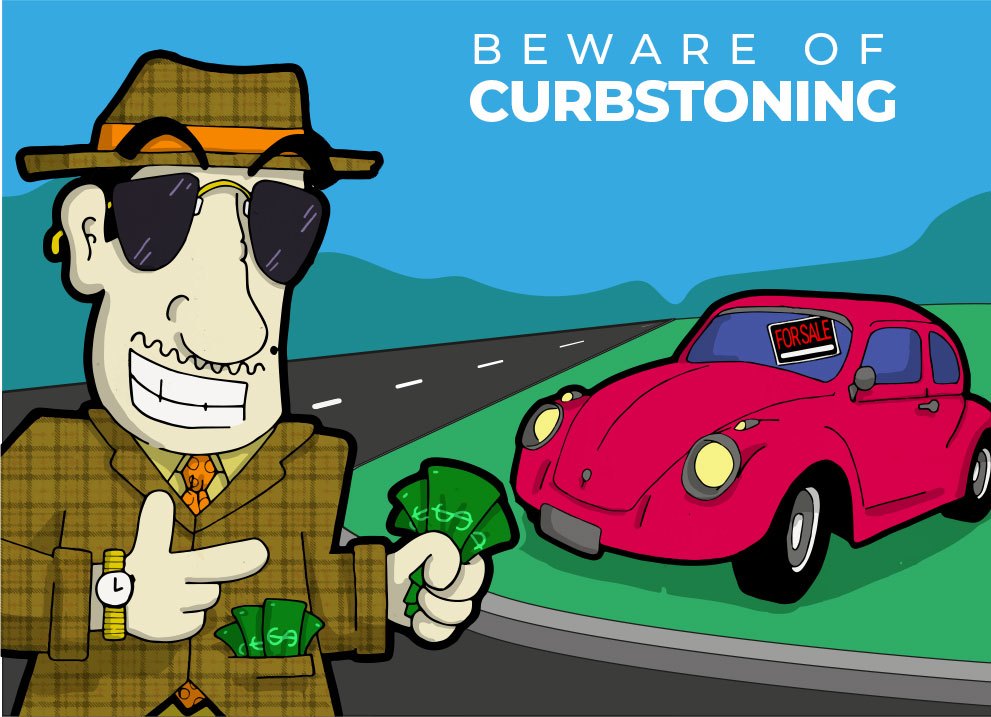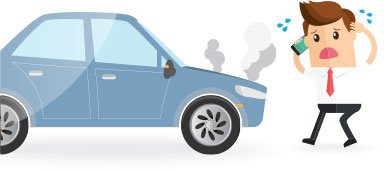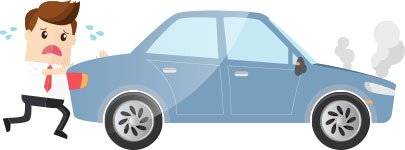Mitigate the Risks of Buying a Curbstoned Vehicle


Nate saved his money for months, taking extra shifts at the restaurant where he worked every chance he could. He could only borrow his roommate’s car for so long, and though the car he noticed parked on the street with a huge For Sale sign on his way to work wasn’t exactly what he was looking for, the price seemed too good to pass. He met the owner of the car on Friday afternoon a couple hours before his evening shift. Kevin seemed like a nice guy.
“The car belongs to my daughter,” he said. “She just got married and doesn’t need it anymore.” Nate can’t believe his luck. Forking over half the cost of what he expected to pay for a used car, Nate drove to work with a smile on his face. The smile lasted almost two weeks when the car broke down and he found out it would cost more than he paid for the car to fix it.
Though Nate didn’t realize it at the time, the car “Kevin” sold him was a lemon, and the seller knew it, having bought it from salvage and fixed it up to look like a perfectly well-functioning vehicle. Kevin’s daughter? A ruse to convince a gullible buyer to not even consider that there might be something wrong with the vehicle. When Nate tried to contact Kevin in hopes of getting his money back, the phone number had been disconnected, and Nate was now stuck with a vehicle that could do little more than sit in his apartment parking lot.
Nate has just been the victim of curbstoning, and it’s probably more common that most people realize. It’s also illegal, though, as the story above goes to show, perpetrators of the crime are hard to catch.

This is when an individual, as a private seller without a dealer license, purchases cars and resells them on the streets for more than the car is actually worth. This is also referred to as flipping cars, but curbstoned cars often have serious issues that aren’t disclosed at the time of the sale. The buyer usually finds out later, after it’s too late. When a curbstoner sells a car, in most cases, they do so without transferring the car title into their name. Hence, one of many reasons why curbstoners are hard to identify.
Curbstone transactions are often initiated through Craigslist, Offerup, and similar classified. Because the seller isn’t a licensed dealer, they don’t have the liability of a car dealership, and because their motivation is simply to increase their margins, the cars they sell are often subpar in terms of safety and quality. They care little for the buyer and see them as means to an end.

Common issues of curbstoned vehicles include salvage titles that aren’t disclosed, paperwork issues (and they may not even give you the title), mileage roll back (the car you buy may not have the low miles that have been advertised), and mechanical issues, such as a bad transmission the seller covers up. In some cases, a vehicle may have been written off as a total loss by an insurance company as a result of the car suffering damage from a flood or collision.
Furthermore, buyers often face problems in transferring the purchased vehicle into their name because the car has changed owners multiple times and the seller didn’t even have the car in his or her name.
Anyone can privately sell a car under certain conditions, as outlined by each state. In the state of California, for example, a private seller can sell a vehicle “by owner” as long as the vehicle is registered in the seller’s name and insured by the seller. However, each state has a designated number of cars an individual is allowed to sell a year as a private seller. In California, that number is five.
When a seller begins to sell cars above the limit, in the eyes of the law, they’re no longer seen as a private seller and are required to get a dealer license to sell cars. Curbstoners, however, aren’t operating a legal business, and they avoid everything that makes a licensed dealer a trustworthy seller.

Licensed dealers pay for insurance for the vehicles they sell, the property where the cars are sold, and an official business license, as well as a dealer license. Dealers are held to stringent standards and are vetted by the DMV. If they break the law, they are easily found out, and they will be held liable.
Curbstoners, who are unlicensed and sell their cars on the street or through Craigslist or other similar classified sites, present an unfair competition to legitimate dealers. When licensed dealers have to compete with people breaking the law, it hurts their business and threatens to put legitimate dealerships out of business.
Car salesmen have a certain reputation, and curbstoners take advantage of this customer perception. You’ve probably been there or heard about an experience from someone else. You walk into a car dealership, hoping to browse without the pressure of having to make hasty decision, when a sharply dressed salesman with a bright smile walks up and begins a quick journey to a statement somewhere along the lines of, “What can we do to get you to drive this car home today?”
It’s no wonder car buyers find comfort in buying from a private seller rather than a dealership. With a private seller, you can look for the car you want and approach the seller when you’ve found a vehicle you’re interested in.

Not all private sellers are curbstoners, so it’s important to be on the lookout for some common clues that may reveal a seller as a curbstoner.
A vehicle title not in the seller’s name is usually a dead giveaway for a curbstoner. If the title isn’t in the seller’s name, don’t be afraid to ask why, and pay attention to the story they give you. Often, the seller will tell you a strange story about how they’re selling the car for their wife’s brother or a family friend. Don’t believe it if the seller can’t prove it. The truth is that the seller likely doesn’t have the title in his name because he wants to avoid having his name connected to the vehicle, freeing him of responsibility if something goes wrong. Additionally, the seller is probably avoiding paying any required sales tax by simply pocketing the cash used to pay for the vehicle.
Curbstoners will never sell a car in a location where they have a personal connection. After all, they don’t want to be identified. If the seller suggests somewhere public to meet and avoids the suggestion of meeting you at their home, it doesn’t necessarily mean that they’re a curbstoner, but they may be.
If you find a car listing on Craigslist or other classified site that catches your eye, look up the seller’s number to see if they have multiple listings of cars. If so, they’re almost certainly a curbstoner.
Use Carfax to look at ownership and accident history of a vehicle before you buy. A lot of times curbstoners will say they are the only owner of the vehicle. Play detective and match up their story if it seems off, and if it does, then walk away.
When you call about a vehicle listing, mention that you saw “the car” they’re selling, but be purposefully vague about any specifics about the car. If the seller doesn’t automatically know which car you are talking about, this person is likely selling multiple cars. Avoid at all cost.
It’s a good idea to get a car inspected before you make a purchase. Curbstoners will want to rush the sale. They’re giving you a great deal, they want you to believe, and it’s too good to pass up. If the seller is leery of allowing you to get the vehicle inspected before you buy, you’re probably dealing with a curbstoner who doesn’t want you to discover something significantly wrong with the vehicle before they have the chance to swindle you out of your money.
Beware of cash only sales. If a seller refuses to accept anything other than cash, it’s likely because they don’t want anything that will tie a check or money order to their name, which will be the case if they cash the check at a bank or deposit it. A simple exchange of cash means there’s no record of the seller having received payment for a vehicle, and there’s not paper trail to follow up on.
Ask lots of questions. How long have you had the vehicle? Why are you selling it? Is there a warranty remaining? This last question is especially important because if there is a warranty remaining on a vehicle, you’ll most certainly want to make sure that the warranty can be transferred to you upon purchase of the vehicle.
Not always. In some cases, we’ve seen individuals end up with cars that were okay. After all, curbstoners aren’t primarily motivated to sell people bad cars; they sell bad cars when it offers them the opportunity to make the most money in a sale. You could get lucky and purchase a quality vehicle from a private seller selling multiple cars, but the risks far outweigh the rewards here, more often than not.
If you can sense or see that someone is a curbstoner, we recommend staying away. You’ll be better off spending a little more time finding an honest seller of a vehicle you won’t regret purchasing.
This kind of story is unfortunately all too common. You want to try to avoid buying from a curbstoner by looking for the clues mentioned above.
If you do purchase a bad vehicle from a curbstoner, however, you can contact your local DMV and tell them about the situation. Unfortunately, because these individuals are experts at staying under the radar, as the buyer of the Honda Accord discovered, you’ll likely be out of the money you spent.
The car may also fail inspections, and if you decide to attempt to sell the car, you’ll have to disclose the condition of the car, unlike the curbstoner you bought it from.
Getting swindled is never fun. Getting a new car should be fun and exciting. As you’ve seen, however, not every seller has your best interests in mind. So take these precautions to avoid getting taken advantage of. With a little time and some savvy investigating, you’ll find a car you can depend on from a seller that isn’t out to make a quick buck at your expense. Regardless of who you buy the car from, these tips will help you to protect your and protect your investment.